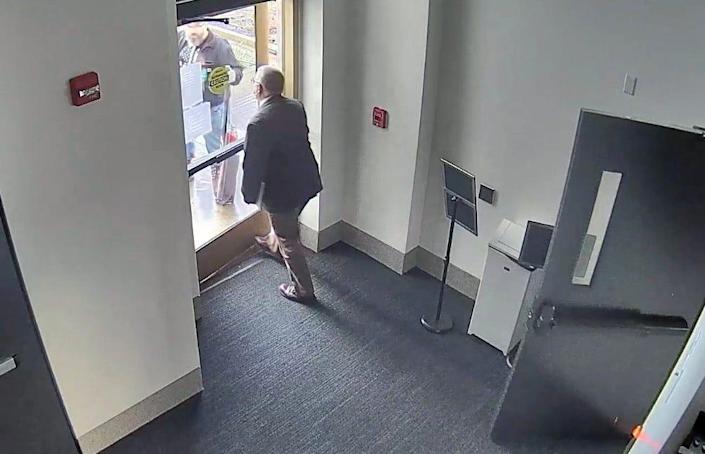 |
|---|
| A still from a security camera showing Rep. Mike Nearman opening an exterior door, which allowed rioters access to the Oregon State Capitol building on Dec. 21, 2020. |
 
|
Oregon GOP legislator ousted over state Capitol breach
USA Today
Fri June 11, 2021
SALEM, Oregon — The Oregon House of Representatives ousted Republican Representative Mike Nearman Thursday night, the first time in state history a sitting Oregon lawmaker has been expelled.
The tally was 59-1, with the only vote against coming from Nearman himself. He showed no contrition during brief comments on the floor of the House.
Nearman was removed for the disorderly behavior of allowing rioters into the closed Capitol building during a special legislative session on Dec. 21, 2020.
His actions led to dozens of people — some armed and wearing body armor — gaining access to the Capitol, thousands of dollars in damage and six injured Salem and Oregon State police officers.
"Colleagues, it couldn't be any clearer. Rep. Mike Nearman intentionally allowed armed protestors, occupiers, to illegally enter the building during the peak of the pandemic," Rep. Paul Holvey, D-Eugene, said on the floor of the House. "He coordinated with his supporters and extremist groups and then opened a door to let them in."
Lawmakers commented on the day being "sad" and "somber" but said the Legislature had a responsibility to expel Nearman after he put his colleagues and staff at risk and has refused bipartisan calls for his resignation.
"Expulsion is the only reasonable course of action," said Rep. Andrea Salinas, D-Lake Oswego.
Article IV Section 15 of the Oregon Constitution gives each chamber the right to punish its members for "disorderly behavior," and punishment can include expulsion.
A few dozen protesters — many of whom were also present at the Dec. 21 riot — gathered outside the Capitol building during the expulsion vote in support of Nearman. There were chants of "let us in" and banging on an exterior door, both audible from inside the House chamber.
A cheer went up when Nearman spoke, appearing via large TV screens arranged outside, a staple of a mid-pandemic Legislature.
Nearman made a brief statement, decrying that the building remains closed to the public and what he considers a lack of due process for his expulsion.
"There's no reason to hear both sides and have at least something resembling due process," he said, sarcastically. "The party in power doesn't have to be fair — might makes right. So, if that's what you want to do, let's do what the people have sent us here to do. Let's decide."
No other Republicans spoke during the floor debate.
Nearman left after all the votes were in, exiting the House chamber and removing his face mask on the way. His supporters outside gathered around the Capitol parking garage exit and heckled lawmakers as they drove away.
House Speaker Tina Kotek, D-Portland, had introduced House Resolution 3 on Monday and created the bipartisan special committee that unanimously voted Thursday afternoon to move the resolution to the full House.
The House suspended certain legislative process rules to allow lawmakers to vote on the resolution immediately.
"The facts are clear that Mr. Nearman unapologetically coordinated and planned a breach of the Oregon State Capitol," Kotek said in a statement after the vote. "His actions were blatant and deliberate, and he has shown no remorse for jeopardizing the safety of every person in the Capitol that day."
Republicans had stayed mostly silent on Nearman's actions until the past week, after a video surfaced that showed Nearman suggesting to a crowd days before the riot that if demonstrators texted him he might let them into the Capitol.
The other 22 members of the House Republican caucus called on Nearman to resign from the Legislature through a letter on Monday.
"It is our belief as friends and colleagues that it is in the best interest of your caucus, your family, yourself, and the state of Oregon for you to step down from office," the letter read, in part.
Democrats have been calling for Nearman's resignation or expulsion for months, with many redoubling those calls in the wake of the video becoming widely known.
The video — livestreamed on YouTube Dec. 16 — was of him speaking to the Oregon Citizens Lobby, a right-leaning political engagement group whom he described as legislative nerds and mostly "blue-haired old ladies."
"There might be some person’s number which might be (his cellphone number), but that is just random numbers ... that’s not anybody’s actual cellphone," Nearman said in the video. "And if you say, ‘I’m at the West entrance’ during the session and text to that number there, that somebody might exit that door while you’re standing there.”
Nearman also faces criminal charges stemming from the incident. He was arraigned May 11. They are misdemeanors but do carry possible jail time.
Before the second video was discovered a nonpartisan legislative investigation concluded that Nearman "more likely than not" let demonstrators into the building on purpose.
That investigation relied largely on video evidence from security cameras at the Capitol.
Video evidence shows Nearman exiting the Capitol at 8:29 a.m. on Dec. 21 from the vestibule entrance on the House side.
At the time, only one demonstrator was standing near the door. When Nearman exited, he stepped around the demonstrator and the man rushed in. A second quickly followed, and they both waved for others to join them while holding the outside door open.
Three more did so before police officers arrived and shoved them back outside. But by then the door was being held open from the outside and the four officers were not able to close it.
Police eventually needed to pull back due to a chemical irritant being released.
Ultimately at least 50 people accessed the Capitol’s vestibule. Six Salem and Oregon State police officers were pepper-sprayed in the ensuing scuffles.


 Share your thoughts in the Forum
Share your thoughts in the Forum
